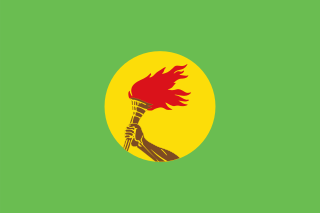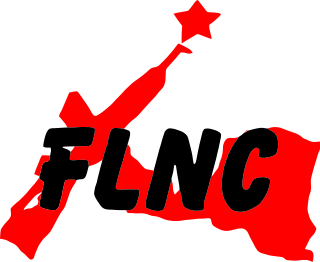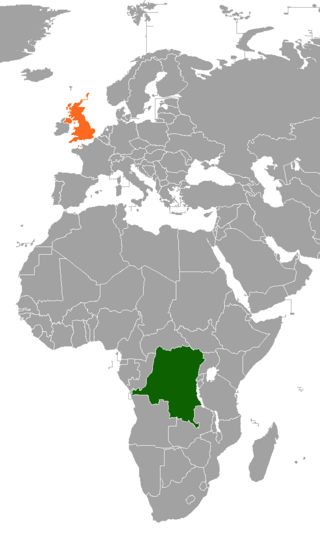| |||||
| Decades: | |||||
|---|---|---|---|---|---|
| See also: | History of Zaire | ||||
The following lists events that happened during 1975 in Zaire .
| |||||
| Decades: | |||||
|---|---|---|---|---|---|
| See also: | History of Zaire | ||||
The following lists events that happened during 1975 in Zaire .
| Date | Event |
|---|---|
| Railway line from Bumba to Aketi is opened by the Société Nationale des Chemins de Fer Zaïrois . | |
| Dikuluwe Mine, a copper and cobalt mine in Katanga Province, is opened. | |
| 2 November 1975 | The 244 candidates of the Popular Movement of the Revolution are elected by acclaim in the 1975 Zairean parliamentary election. |
| 24 November | A parade is held in Kinshasa to celebrate ten years of rule by President Mobutu Sese Seko. [1] |

Zaire, officially the Republic of Zaire, was the name of the Democratic Republic of the Congo from 1965 to 1997. Zaire was located in Central Africa and was, by area, the third-largest country in Africa, and the 11th-largest country in the world. With a population of over 23 million inhabitants, Zaire was the most populous officially Francophone country in Africa, as well as one of the most populous in Africa.

Mobutu Sese Seko Kuku Ngbendu wa za Banga, commonly known as Mobutu Sese Seko or simply just Mobutu, was a Congolese politician and military officer who was the president of Zaire from 1965 to 1997. He also served as Chairman of the Organisation of African Unity from 1967 to 1968. During the Congo Crisis, Mobutu, serving as Chief of Staff of the Army and supported by Belgium and the United States, deposed the democratically elected government of left-wing nationalist Patrice Lumumba in 1960. Mobutu installed a government that arranged for Lumumba's execution in 1961, and continued to lead the country's armed forces until he took power directly in a second coup in 1965.

Léon Kengo wa Dondo is a Congolese politician who served as the "first state commissioner" several times under Mobutu Sese Seko in Zaïre. He was one of the most powerful figures in the regime and was a strong advocate of economic globalization and free-market economics. He served as President of the Senate of the Democratic Republic of the Congo from 2007 to 2019.

The national flag of the Democratic Republic of the Congo is a sky blue flag, adorned with a yellow star in the upper left canton and cut diagonally by a red stripe with a yellow fimbriation. It was adopted on 18 February 2006. A new constitution, ratified in December 2005 and which came into effect in February 2006, promoted a return to a flag similar to that flown between 1963 and 1971, with a change from a royal blue to sky blue background. Blue represents peace. Red stands for "the blood of the country's martyrs", yellow the country's wealth; and the star symbol the future for the country. It is one of the few national flags incorporating a diagonal line, with other examples including Tanzania, Namibia, Trinidad and Tobago, and Brunei.

The First Congo War (1996–1997), also nicknamed Africa's First World War, was a civil war and international military conflict which took place mostly in Zaire, with major spillovers into Sudan and Uganda. The conflict culminated in a foreign invasion that replaced Zairean president Mobutu Sese Seko with the rebel leader Laurent-Désiré Kabila. Kabila's unstable government subsequently came into conflict with his allies, setting the stage for the Second Congo War in 1998–2003.

The Popular Movement of the Revolution was the ruling political party in Zaire. For most of its existence, it was the only legally permitted party in the country. It was founded by Joseph-Désiré Mobutu on 20 May 1967.

Mobutism or Mobutuism was the state ideology of Zaire during the latter half of the 20th century, when it was under the one-party rule of the Popular Movement of the Revolution. Mobutism encompassed and glorified the thoughts, visions, and policies of Zairian president and self-proclaimed "Father of the Nation," Mobutu Sese Seko. The ideology included such major Mobutu initiatives as "Zairianization."

Catholicism has a major presence in the Democratic Republic of the Congo (DRC). It is part of the worldwide Catholic Church under the spiritual leadership of the Pope in Rome.

Jean Nguza Karl-i-Bond was a prominent Zairian politician.

Authenticité, sometimes Zairianisation in English, was an official state ideology of the regime of Mobutu Sese Seko that originated in the late 1960s and early 1970s in what was first the Democratic Republic of Congo, later renamed Zaire. The authenticity campaign was an effort to rid the country of the lingering vestiges of colonialism and the continuing influence of Western culture and to create a more centralized and singular national identity.

Shaba I was a conflict in Zaire's Shaba (Katanga) Province lasting from 8 March to 26 May 1977. The conflict began when the Front for the National Liberation of the Congo (FNLC), a group of about 2,000 Katangan Congolese soldiers who were veterans of the Congo Crisis, the Angolan War of Independence, and the Angolan Civil War, crossed the border into Shaba from Angola. The FNLC made quick progress through the region because of the sympathizing locals and the disorganization of the Zairian military. Travelling east from Zaire's border with Angola, the rebels reached Mutshatsha, a small town near the key mining town of Kolwezi.
Mobutu Sese Seko's foreign policy emphasized his alliance with the United States and the Western world while supposedly maintaining a non-aligned position in international affairs. Mobutu ruled the Republic of the Congo and then Zaire as president for 32 years, from 1965 to 1997.

The Congolese National Liberation Front is a political party funded by rebels of Katangese origin and composed of ex-members of the Katangese Gendarmerie. It was active mainly in Angola and Zaire during the 1970s.

Democratic Republic of the Congo–United States relations are the international relations between the Democratic Republic of the Congo and the United States of America.

Democratic Republic of the Congo–Russia relations are the bilateral foreign relations between the Democratic Republic of the Congo and Russia. The Democratic Republic of the Congo has an embassy in Moscow and an honorary consulate in Yekaterinburg. Russia has an embassy in Kinshasa. The relations between the two countries were established on July 7, 1960, and restored since November 30, 1967.

Congolese nationalism in the Democratic Republic of the Congo was also for a time known as Zairian nationalism during the rule of Mobutu Sese Seko. Congolese nationalism persists among the people of the Democratic Republic of the Congo, in spite of civil war and the lack of a clear definition of what it means to be Congolese.
The following lists events that happened during 1972 in Zaire.
This is a list of Chiefs of Staff of the armed forces of the Democratic Republic of the Congo and Zaire.

Democratic Republic of the Congo–United Kingdom relations are the bilateral relations between the Democratic Republic of the Congo and the United Kingdom. The Democratic Republic of the Congo maintains an embassy in London and the United Kingdom maintains an embassy in Kinshasa.